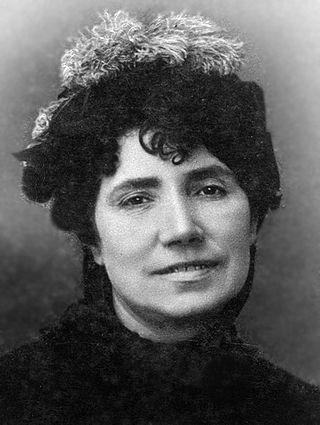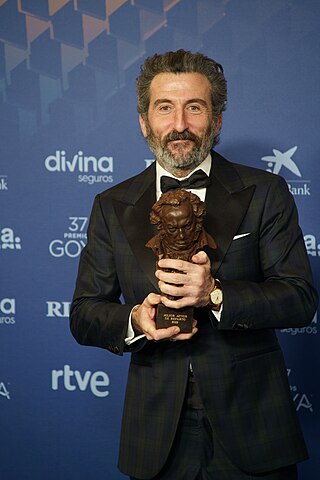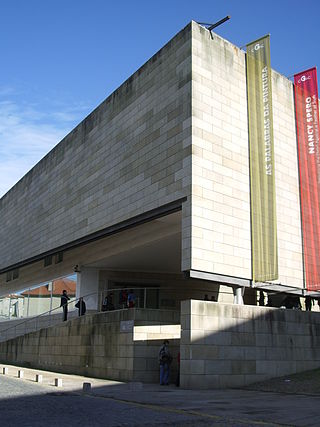
Galicia is an autonomous community of Spain and historic nationality under Spanish law. Located in the northwest Iberian Peninsula, it includes the provinces of A Coruña, Lugo, Ourense, and Pontevedra.

María Rosalía Rita de Castro, was a Galician poet and novelist, considered one of the most important figures of the 19th-century Spanish literature and modern lyricism. Widely regarded as the greatest Galician cultural icon, she was a leading figure in the emergence of the literary Galician language. Through her work, she projected multiple emotions, including the yearning for the celebration of Galician identity and culture, and female empowerment. She is credited with challenging the traditional female writer archetype.

The Galician Nationalist Bloc is a political party from Galicia, formed with the merger of a series of left-wing Galician nationalist parties. It is self-defined as a "patriotic front".

Galician–Portuguese, also known as Old Galician–Portuguese, Old Galician or Old Portuguese, Medieval Galician or Medieval Portuguese when referring to the history of each modern language, was a West Iberian Romance language spoken in the Middle Ages, in the northwest area of the Iberian Peninsula. Alternatively, it can be considered a historical period of the Galician, Fala, and Portuguese languages.

Alfonso Daniel Manuel Rodríguez Castelao, commonly known as Castelao, was a Galician politician, writer, painter and doctor. He is one of the fathers of Galician nationalism, promoting Galician identity and culture, and was one of the main names behind the cultural movement Xeración Nós. He was also one of the founders and president of the Galicianist Party and had a great influence on the renovating group of Galician art known as Os renovadores. Castelao is considered to be the most important figure in Galician culture of the 20th century.

The art of motion-picture making within Spain or by Spanish filmmakers abroad is collectively known as Spanish Cinema.

Martin Codax or Codaz, Martín Codax or Martim Codax was a Galician medieval joglar, possibly from Vigo, Galicia in present-day Spain. He may have been active during the middle of the thirteenth century, judging from scriptological analysis. He is one of only two out of a total of 88 authors of cantigas d'amigo who used only the archaic strophic form aaB. He employed an archaic rhyme scheme whereby i~o / a~o were used in alternating strophes. In addition Martin Codax consistently utilised a strict parallelistic technique known as leixa-pren. There is no documentary biographical information concerning the poet, dating the work at present remains based on theoretical analysis of the text.
Reintegrationism or Lusism is a linguistic movement in Galicia that advocates for the recognition of Galician, along with other varieties of the Portuguese language, as a single language. Reintegrationists argue that the different dialects of Galician and Portuguese should be classified as part of the Galician-Portuguese language, rather than two languages within a common branch. The largest reintegrationist association is the Galician Language Association (AGAL).

Galicians are a Romance-speaking European ethnic group from northwestern Spain; they are closely related to the northern Portuguese people and has its historic homeland in Galicia, in the north-west of the Iberian Peninsula. Two Romance languages are widely spoken and official in Galicia: the native Galician and Spanish.
The Galician People's Union is a Galician nationalist and communist political party, and is one of the registered political parties of Spain. The party publishes the magazine Terra e Tempo, and the secretary general is Néstor Rego.

Delmi Álvarez is a Galician photojournalist and documentary photographer (he/him). His work documents migration phenomena, especially of the Galician diaspora, and environmental and human rights issues. He has organized and curated several photography projects with other international photographers.

Galician, also known as Galego, is a Western Ibero-Romance language. Around 2.4 million people have at least some degree of competence in the language, mainly in Galicia, an autonomous community located in northwestern Spain, where it has official status along with Spanish. The language is also spoken in some border zones of the neighbouring Spanish regions of Asturias and Castile and León, as well as by Galician migrant communities in the rest of Spain, in Latin America including Puerto Rico, the United States, Switzerland and elsewhere in Europe.
Loita Armada Revolucionaria(LAR) (English: Revolutionary Armed Struggle) was an armed Galician nationalist and left-wing independentist organisation. Linked to the political party Galician Party of the Proletariat and the organization Galiza Ceibe-OLN, the group was formed in 1978 and carried out several attacks around Galicia, such as bank assaults and bombing campaigns.

The Galician independence movement or the Galician separatist movement is a political movement which supports the independence of Galicia and the other Galician-speaking territories outside the Autonomous Community of Galicia, including As Portelas, O Bierzo, and the Eo-Navian lands from Spain, and possibly the North Region from Portugal due to its cultural and historical connection with Gallaecia.
The Exército Guerrilheiro do Povo Galego Ceive was an armed organization formed in 1986 mainly by members of Galiza Ceibe-OLN. It was considered a terrorist organisation by the Spanish Government. The main goals of the organization were the independence of Galicia and the transformation of society according to the principles of socialism. The EGPGC was operative between 1987 and 1991, a time during which the EGPGC made a total of 90 armed actions and a multitude of provisioning actions.

Óliver Laxe Coro is a French-born Spanish film director, screenwriter and actor of Galician ancestry. His debut feature film You All Are Captains premiered at the 2010 Cannes Film Festival, where it won the FIPRESCI Prize. His third film Fire Will Come was screened in the Un Certain Regard section at the 2019 Cannes Film Festival, where it won the Jury Prize.

José Luis Castro Zahera is a Spanish actor from Galicia. He is known for his performances in supporting roles in Galician and Spanish films and television series.

Pilar García Negro is a Galician/Spanish politician, writer, sociolinguist, teacher, and campaigner in support of Galego, the Galician language, which is spoken in the northwest of Spain and the extreme north of Portugal.

The Centro Galego de Arte Contemporánea, CGAC is an arts centre based in Santiago de Compostela that aims to promote culture in Galicia through exhibition, enjoyment and knowledge of the trends and currents of contemporary artistic creation.

Os Renovadores or Os Novos was a group of artists who wanted to renew the visual Galician arts from the 1920s.


















